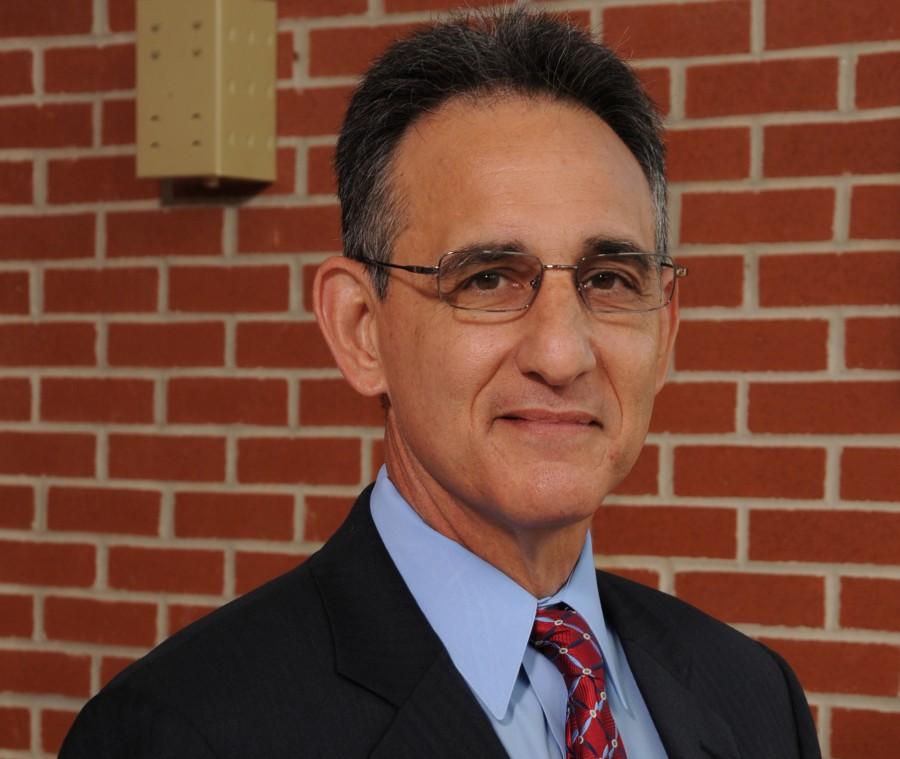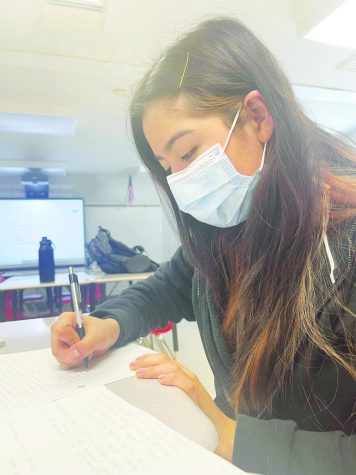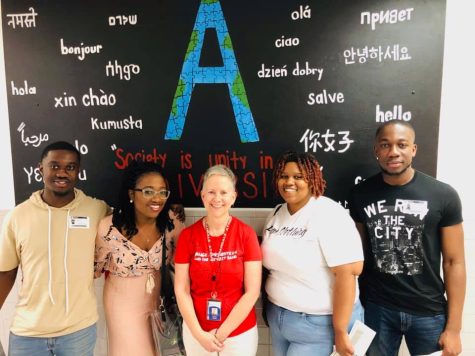Randazzo Retires
One of the most unexpected retirements this year is that of Principal Vincent Randazzo.
Randazzo announced his retirement to the faculty in a meeting after school on Friday, May 22.
Unfortunately, Randazzo could not be reached for comment at the time of publication, because he is on vacation with his family in Paris, France. However, Randazzo did tell the faculty that he is retiring so that he will have more time to spend with his family.
Randazzo has been principal at AHS for four year, and has been working here for 14.
During his time as principal, Randazzo has been involved in a lot of changes at AHS, including the introduction of the Atom Pride initiative, and being involved in having Michelle Obama come to speak at AHS.
Another hard-hitting retirement from this year is that of long time teacher, John Hawes.
As Hawes walks around his classroom, room 294, it is easy to tell that he has been teaching here for a while. After 15 years, he has accumulated a lot of things, including posters made for him by a number of his former students and a wall in the back of his room filled with magazine covers and comic strips.
One poster uses dramatic visuals to claim that Hawes was a spy prior to beginning his career as a teacher. While this is not exactly true, Hawes did do works for the government.
“I worked in the state department, I did the foreign service,” Hawes said. “While I was in the foreign service, I did a lot of East West arms control, I did NATO alliance affairs, negotiations with the former Soviet Union, that kind of stuff. But I did a variety of other things too. In India I was an economic officer, for example. In Ethiopia, I was the one person in the embassy who was trained in Amharic.”
Hawes’ work for the state department allowed him to travel all around the world for his job. He has done work in Naples, Calcutta, New Delhi, Vienna and Brussels. However, most of his work was done in Washington.
As a teacher here, Hawes was able to interact with a lot of students with many different backgrounds.
“One thing that I have gotten from working with so many different students is food. I have been able to experience a great variety of foods from all around the planet,” Hawes said.
Hawes began teaching here 15 years ago after retiring from the state department.
“When I retired from the state department, I was looking for something which might vaguely fit what I do. I’m not an expert in law, medicine, mathematics, I am a generalist. That’s what diplomacy is, it’s a generalist field, so is teaching,” Hawes said.
During his time here, Hawes has taught government, geography, and theory of knowledge.
Throughout his years teaching here, Hawes has made an impact on many students, even those who he just met this year.
“I was so scared the first quarter, because every time [Mr. Hawes] would call on me, I would mess up and stutter. But as the year progressed, I learned that he is very understanding and kind,” senior Julia Nguyen said. “I love his teaching style and I’m so thankful to have had the chance to be with him this year.”
While Hawes has made an impact on his students, his students have also made an impact on him.
“Every year there is a new crop of students, and they’re always different than the last,” Hawes said. “Who knew that I was going to meet a student who worked in Black-Jewish relations? Who knew someone was going to make me a poster from Sun Tzu? Who knew someone was going to make me a poster that says “teaching is just a day job?” I’ve met a lot of great students throughout my time teaching.”
Individual students have had their impact on Hawes, but he has also taken different lessons away from his teaching experience as well.
“I have become a little bit better at keeping my mouth shut,” Hawes said. “I think I have learned a little about being quiet and letting the students answer the questions, because, eventually, they will come up with the answer. And what you want to do in teaching is give them the space to come up with it.”
Hawes grew up and worked in the World War II and Cold War eras, so for him, 21st century problems are a lot different than problems when he was growing up.
“You kids have an approach to the 21st century that I can’t fully comprehend. I look at the 21st century, and I see all of these issues and problems that need to be attacked vigorously, and I feel depressed,” Hawes said. “But you kids, you’re digging into the 21st century, and I look around and I see young people who are actually attacking them with this energy, and that’s impressive. It inspires me, gives me hope. My students give me the energy to keep going.”
Other retiring teachers this year include IB Diploma Coordinator Shirley Campbell and Administrative Assistant Carol Leventhal.
“I’m leaving to be closer to my parents in Stafford. SO I will working in Stafford County school system,” Leventhal said.
AHS is a very special place for many of the faculty members that work here, and it will always be a place where they feel at home.
“This really is a home for me,” Leventhal said. “I’m going to miss the students most of all, they keep me young and active and in the know of what’s going on in the world.”
Students have an impact on teachers, and teachers also have a profound impact on students.
“Mrs. Campbell has been my support system through everything from school and college applications to teachers, friends and even boys,” senior Divakaruni Chowdhary said. “She has been like a second mother and I would be extremely upset if this wasn’t the year that I was leaving as well, because high school for me just wouldn’t be the same without Mrs. Campbell.”
“I’m really going to miss joking around with [Mr. Hawes] and learning from him, since he teaches a lot from experience,” senior Kaitlyn Cook said. “He has done it all, and I can only aspire to do half of the things that he has done in his life. Happy retirement Mr. Hawes, you will definitely be missed!”
Many teachers like to leave parting advice or wisdom to their students, and this year is no different.
“[If I were to give advice,] I would quote Kung Fu Panda. Guys, there are no accidents. If you are going to succeed, there are reasons for that, this is not an accident,” Hawes said. “This does not mean that things are random. It does mean that what you put in today pays back tomorrow. We tend to look at life as a whole mass of random stuff, but it ain’t.”
Leventhal:
I’ve been here on and off for about 10 years
I will miss the students most of all. Students keep me young and active and in the know with what’s going on in the world.
This is really a home for me, so I’m really going to miss it.
Hawes:
I really enjoyed the business of getting out into the countryside. I was in consulates and embassies obviously, but the most fun is getting out of those places and getting out into the country. I travelled across India, Ethiopia, those kinds of things were a lot more fun then you know just the capital city
The government was both seniors and sophomores. Geography, I was the first one to teach the course, I got here when they first adopted it as a course.
I have specific posters and specific events [that stand out], but I wouldn’t pick out one single one [as a favorite]. It’s the fact of the collection that makes it exciting.
I would have stayed in diplomacy longer, but they retired me [from the foreign service].
*Holds up cane* This is fun, but I can’t do it. I can’t keep up with you guys.
It’s hard to think seriously about [what I want to do now]
Some time over the summer, I will sit down and try to figure out if I have anything specifically that I have to do.
I’m going to read a lot.
50 years ago, going off into the foreign service, the notion is that “okay, fine” you eventually you will retire to a hilltop in Tuscany and you drink wine. I don’t see myself doing that.
I have far less notion of what the future is than I did 50 years ago.
You’re dealing with people who have less experience than you do, but who have different insights than you do. The first instinct as a teacher is to say that “I know the answer to that question.”












